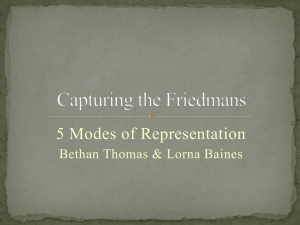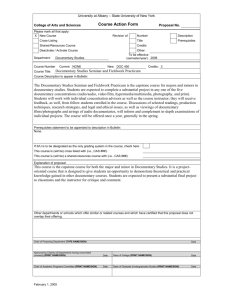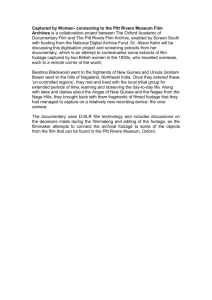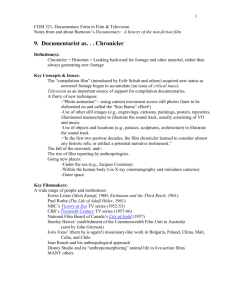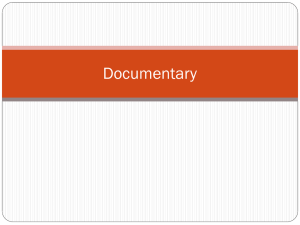Course description2
advertisement
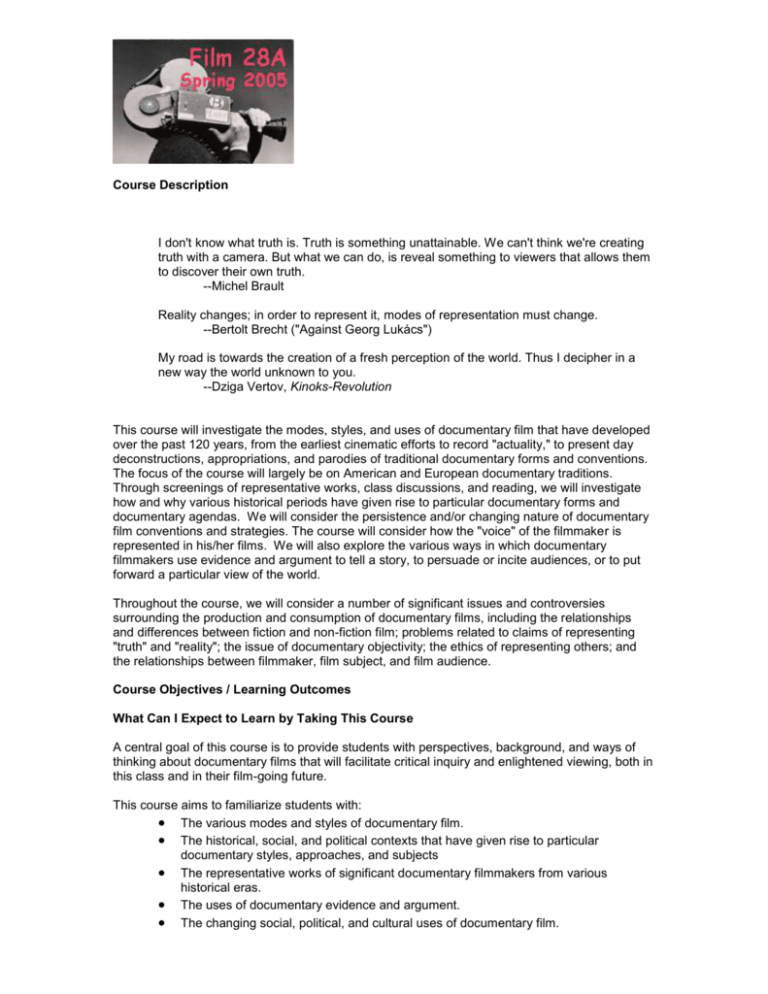
Course Description I don't know what truth is. Truth is something unattainable. We can't think we're creating truth with a camera. But what we can do, is reveal something to viewers that allows them to discover their own truth. --Michel Brault Reality changes; in order to represent it, modes of representation must change. --Bertolt Brecht ("Against Georg Lukács") My road is towards the creation of a fresh perception of the world. Thus I decipher in a new way the world unknown to you. --Dziga Vertov, Kinoks-Revolution This course will investigate the modes, styles, and uses of documentary film that have developed over the past 120 years, from the earliest cinematic efforts to record "actuality," to present day deconstructions, appropriations, and parodies of traditional documentary forms and conventions. The focus of the course will largely be on American and European documentary traditions. Through screenings of representative works, class discussions, and reading, we will investigate how and why various historical periods have given rise to particular documentary forms and documentary agendas. We will consider the persistence and/or changing nature of documentary film conventions and strategies. The course will consider how the "voice" of the filmmaker is represented in his/her films. We will also explore the various ways in which documentary filmmakers use evidence and argument to tell a story, to persuade or incite audiences, or to put forward a particular view of the world. Throughout the course, we will consider a number of significant issues and controversies surrounding the production and consumption of documentary films, including the relationships and differences between fiction and non-fiction film; problems related to claims of representing "truth" and "reality"; the issue of documentary objectivity; the ethics of representing others; and the relationships between filmmaker, film subject, and film audience. Course Objectives / Learning Outcomes What Can I Expect to Learn by Taking This Course A central goal of this course is to provide students with perspectives, background, and ways of thinking about documentary films that will facilitate critical inquiry and enlightened viewing, both in this class and in their film-going future. This course aims to familiarize students with: The various modes and styles of documentary film. The historical, social, and political contexts that have given rise to particular documentary styles, approaches, and subjects The representative works of significant documentary filmmakers from various historical eras. The uses of documentary evidence and argument. The changing social, political, and cultural uses of documentary film. The issues and controversies related to documentary representation, and documentary subjects. In connection with written learning activities, students will be provided with core skills in researching, critically assessing, and writing about documentary films. What Does the Instructor Expect From Me? Attendance and Class Participation You are expected to attend every class session and every scheduled discussion section. Cinema can really only be learned and appreciated through viewing, and since we'll be viewing something almost every session, you need to be present. I'm willing to talk about dire need and emergencies that require you to miss a particular class session, but the excuse better be pretty compelling. Missing more than one class in the semester is serious stuff for me and will definitely impact your grade. I expect you to be more or less on time to every class (that means in your seat by 3:40). I realize that this is a geographically far-flung campus, but still… If there are circumstances that regularly prevent you from being on time, talk to me as soon as possible. Discussion Section Discussion section (1-2; 2-3 Wednesdays) will be used in a number of ways. In some instances, we will use this time slot to screen supplementary documentary materials concerning the topics we're talking about in class (for example, a documentary about the cinema verité movement of the 1960s). Section may also be used to accommodate guest speakers who can't make our regular class session. The balance of the sections will be used to further analyze and discuss the films and topics we're covering in class. If we don't get around to answering all of the questions and points raised by that week's discussion team (see below), section will provide a place to pursue these. Reading There will be required reading for each class session. The readings have been selected to provide depth, context, and focus for our class discussions and viewing: it's important that you keep current with this reading (see the course syllabus for reading schedule). There are two assigned texts for this course: Barnouw, Erik. Documentary: A History of the Non-fiction Film. 2nd rev. ed. New York: Oxford University Press, 1993. Nichols, Bill. Introduction to Documentary. Bloomington, Ind.: Indiana University Press, 2001 There is also a course reader, which is available from Copy Central on Euclid Ave. (across from the North Gate of campus). Most of the materials in the reader have been taken from books and journals in the Doe and Moffitt Library collections. A list of reading sources with library call numbers is provided in the course BlackBoard site. You will be required to keep a reading journal that contains your thoughts about the materials you've read (see below) BlackBoard We will be using a course BlackBoard site as a way of communicating with each other and sharing work and ideas. Each class member will be expected to set up a BlackBoard account after the first class session. BlackBoard will be used to post your reading and viewing logs (see below) and will also be used by your discussion team to post the questions/comments you'll be presenting to class (see below) Outside Viewing In preparation for several class sessions, you will be asked to do outside viewing of a documentary that provides background on the topic we'll be discussing. You can view these documentaries individually or in groups in the Media Resources Center (MRC), basement floor of Moffitt Library. The syllabus lists these required outside viewing titles and their MRC call numbers. Learning Activities: The class will meet twice weekly for two hours per session: Tuesday and Thursday, 3:30-5:30. Each class session will consist of introductory lectures interspersed with the screening of clips and whole films that illustrate the subjects, individuals, or documentary styles being discussed. Individual class participation (5% of course grade) Vigorous participation in class discussions is expected (otherwise, how boring!). A large part of the success of this class will be up to class members. I'd like to keep the class as informal and freewheeling as possible. I need your participation to make this happen. Discussion Teams (10% of course grade) Screenings of long clips or whole films in class will be followed by a class discussion lead by two discussion teams (these three-person teams will be assigned during the first class). It will be the responsibility of each discussion team to pre-screen the film or film clip to which it is assigned before the class discussion (all films/film clips will be available for pre-screening in the Media Resources Center, Moffitt Library). The course syllabus indicates which teams are assigned to which film. Each member of the team will be responsible for developing a cogent question, brilliant insight, or other catalyst for discussion. The teams will also be responsible for leading the course discussion regarding their film. Each team can elect a team leader, but I expect each team member to put forward his/her own questions or discussion topic and to lead the discussion. The questions/discussion statements developed by the team should be posted to the course BlackBoard website at least a day before the class session (instructions for doing so will be provided during the first or second class) Viewing and Reading Journal (15% of course grade) For each of the week's assigned readings, I expect you keep an online reading journal (using the course BlackBoard site). The journal can include various things: a few thoughts or questions concerning the material you're reading; quotes you found particularly insightful; rebuttals to statements with which you disagree; interesting things you've learned from the reading; related topics you'd like to pursue. Each entry should be at least two or three paragraphs long (although I'm much more interested in the quality of your comments than the quantity). You will be responsible for posting your reading log comments for the week by the start of the following week. I'll demonstrate how to post on BlackBoard in class (it's easy!). Each class session we will look at a combination of film clips and whole film works. You should keep a log for the week that comments on at least one film segment or film viewed during each class session (i.e. two films per week). Like the reading log, the viewing log can include meditations on the films viewed, questions raised, criticism, or other thoughts. As with your reading log, you will be responsible for posting your viewing log comments for the week on BlackBoard by the start of the following week. Critical Papers (30% of course grade) There will be two short (7-10 page) papers assigned: one due February 15 and one due March 29. For each of these papers, you will be asked to offer a critical assessment of two films from a list that I will provide. The films relate to one of the historical periods or documentary styles we have previously discussed (these are films we have not seen in class). The full assignments are posted on the course BlackBoard site under the ASSIGNMENT tab. Both papers will be due promptly on the dates indicated. Barring documented personal catastrophe or general apocalypse, late papers will categorically NOT be accepted. Final Project (40% of course grade) Due on May 5th (the second to last day of class). There are two final project options: --A 12-15 page research paper --A short (under 10 minute) documentary film Research Paper The paper can focus on some aspect of the materials we've discussed in class to date, for example: An in-depth analysis of an individual filmmaker in historical context The influence of a filmmaker or film movement on subsequent filmmakers and movements A detailed discussion of a particular documentary mode of production Ethical issues in documentary film (e.g., the representation of others) The historical uses of documentary as a tool for political or social change The paper can also focus on any topic related to documentary film that interests you. Whichever path you choose to pursue, a short topic proposal should be submitted to me or Scott by March 30th. The research paper should be rigorously researched, using the library research resources we'll be discussing in class. It is expected that the paper will include a bibliography of the sources you consulted in your research. Footnotes or endnotes should be included, whenever applicable. The paper should include a 1-2 page research log that documents the process and the resources you used in doing your research. In other words: Google and screen-smarts alone won't make it for this project. It goes without saying that these projects should be carefully written and edited. The accurate use of grammar and punctuation are important elements in getting your points across clearly. There will be zero tolerance for plagiarism or other unethical intellectual appropriations. If you are unclear about the definition of plagiarism or academic dishonesty, consult the UCB Student Code of Conduct. Documentary Production The documentary production should be under 10 minutes long. The video should be in the style of one of the film eras, filmmakers, or film modes discussed in class (Flahertyesque, city symphony or poetic mode, Griersonian, 30's social realism, verité, reflexive, etc.) The documentary should be submitted with a two page prospectus that explains the style, era, or maker you have chosen to emulate, and describes the features of your film that align it to such. The documentary option is one that is extremely popular, but which must be very carefully deliberated. Due to extremely limited production equipment and facilities, some students in the past have failed to turn material in on time. Turning out even a short film takes time and experience. You should be well prepared if you choose to pursue this option. The documentary production option is by no means easier or less time-consuming than the research paper. To help you plan ahead, a short project proposal should be submitted for approval to Scott or me no later than March 17th. You can (and are encouraged) to submit a proposal earlier than this date.


